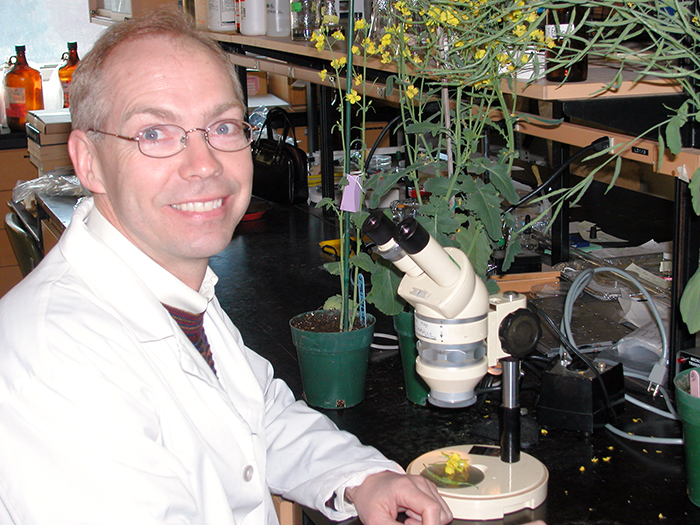
Agricultural entomologist Lloyd Dosdall was recently honoured posthumously with the 2016 Gold Harvest Award, which recognizes individuals who have made exceptional contributions to Agriculture and Agri-Food Canada.
Lloyd Dosdall, a beloved ALES professor who was renowned internationally for his expertise in controlling pests in canola and other crops, has posthumously received special praise from the Canadian government.
The 2016 Gold Harvest Award was bestowed on Dosdall in July to recognize the exceptional and significant contributions he made to the federal department of Agriculture and Agri-Food Canada in the category of innovation, collaboration and service excellence.
The award has been presented since 2001 to salute employees and teams from other government departments, and from universities or external organizations.
Dosdall was honoured as a member of the Entomology Field Guide Team which developed and published a field guide in 2015 titled Field Crop and Forage Pests and their Natural Enemies in Western Canada. It documents 25 years of emerging pests, new science and new pest management technologies, including biological control and biopesticides, all areas of entomology in which Dosdall was prominently immersed.
Just 61 years old when he died of cancer in 2014, Dosdall nonetheless left an enormous legacy of achievements that supplied practical solutions to crop producers' everyday problems.
Among his foremost accomplishments was helping develop several pest-resistant canola varieties by identifying germplasm resistant to root maggots and cabbage seedpod weevils.
"This allows breeders to have a wider genetic pool as they develop cultivars every year," said Héctor Cárcamo, a research scientist at Agriculture and Agri-food Canada and a close, longtime collaborator of Dosdall's.
He also investigated agronomic practices that reduced the impact of significant pests. For instance, "he demonstrated that reduced tillage can help to mitigate flea beetle damage in canola," said Cárcamo.
Another area of his research focused on strategies for integrated pest management, using beneficial insects, predators and parasites to control pests naturally. His documentation of the parasitoids that attack the seedpod weevil paved the way for future biological control of this pest.
In addition to his many studies on canola, Dosdall contributed significantly to the understanding of invasive alien pests of other crops, such as peas and cereals.
By studying insect-host interactions, insect invasion patterns and shifts in insect biodiversity, he also sensitized the agricultural community to the need to both protect and learn more about beneficial organisms.
While he was known best as an agricultural entomologist, he started his career in aquatic entomology and wrote the standard reference book, still in use, on Saskatchewan stoneflies.
Passionate about teaching, Dosdall transferred his knowledge on crop pest management to farmers via practical articles, photos and video that showed them how to adopt beneficial practices.
His formal teaching career began after he earned his MSc and BEd from the University of Saskatchewan, when he taught high school science and biology for six years. After earning his doctorate and spending 10 years at the Alberta Research Council, he joined ALES' Department of Agricultural, Food and Nutritional Science in 1999.
The peer and industry recognition he earned while at the U of A included the 2010 ASTech Award for Innovation in Agricultural Science and the 2013 FarmTech Award for Outstanding Contributions to Alberta's crop industry.